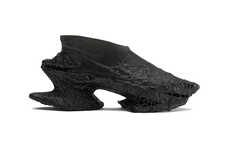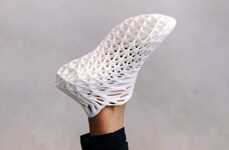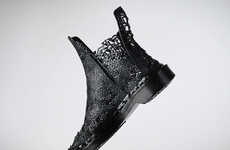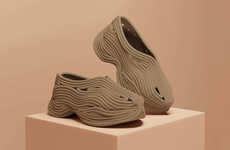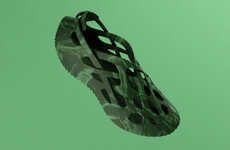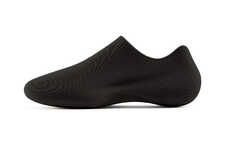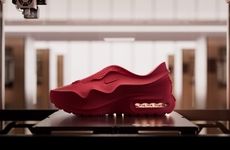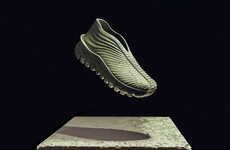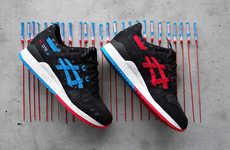
The Sneakerbot II Shoes Can Be Crumpled, Stashed Then Reshaped for Wearing
Amelia Roblin — March 13, 2014 — Fashion
There isn't just one feature of the Sneakerbot II shoes that will grab your interest. These cutting-edge kicks were designed by Ignacio Garcia to be made efficiently and inventively by means of 3D printing technology. With a fine and highly pliable Filaflex 1.75mm filament as the material, the creator can manufacture each individual running shoe in just two pieces: the tongue and everything else.
Everything from the embossed logo and the textural embellishments to the shoelace holes is incorporated into the printing file so that these innovative kicks can be produced holistically. The customer is invited to choose metallic finishes or matte colorful ones to customize his futuristic high-top trainers. What's more, the Sneakerbot IIs are so thin and flexible that they can be scrunched up and carried in a pocket as a spare pair.
Everything from the embossed logo and the textural embellishments to the shoelace holes is incorporated into the printing file so that these innovative kicks can be produced holistically. The customer is invited to choose metallic finishes or matte colorful ones to customize his futuristic high-top trainers. What's more, the Sneakerbot IIs are so thin and flexible that they can be scrunched up and carried in a pocket as a spare pair.
Trend Themes
1. 3d-printed Footwear - The use of 3D printing technology to create unique and personalized footwear offers opportunities for mass customization and reduced waste in the fashion industry.
2. Flexible Filament - The development of new, highly pliable materials for 3D printing can bring about innovations in various industries including medical and automotive.
3. Holistic Production - Incorporating all features of a product into a single 3D printing file can streamline the manufacturing process and increase efficiency in various industries.
Industry Implications
1. Fashion - 3D printing technology can elevate the fashion industry by allowing for personalized designs and on-demand production, reducing waste and lowering costs.
2. Medical Devices - Flexible 3D-printed materials can lead to advancements in the production of prosthetics and other medical devices, potentially making them more accessible and comfortable for patients.
3. Automotive - Flexible 3D printed materials can offer opportunities for faster and more efficient production of automotive parts while also providing greater design flexibility for customization.
4.5
Score
Popularity
Activity
Freshness


